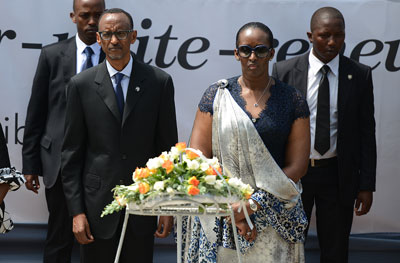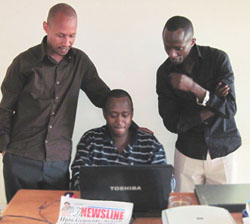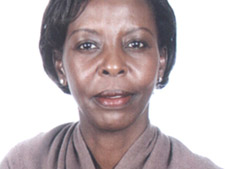
20 years after genocide, Rwanda safe, clean, undemocratic
“Do not forget the genocide,” said the voice of a state broadcast announcer in Kigali crackling through a cheap car radio, referring to the organized slaughter 20 years ago of more than 10 percent of the population. “We are all one now,” he said, speaking in Rwanda’s common language of Kinyarwanda, and meaning that Rwandans…

CPJ opposes prison terms for 2 Rwandan journalists
New York, January 7, 2011–The Committee to Protect Journalists opposes prosecution demands for lengthy prison sentences for the editor and deputy editor of the independent weekly Umurabyo. State Prosecutor Agustin Nkusi requested a 33-year prison sentence for Editor Agnès Uwimana, at left, and 12 years for her deputy, Saidati Mukakibibi, at a High Court hearing on Thursday in…

Censored in Rwanda, editors work from exile
Though it has been a dark year for Rwanda’s press, it has also been a year of resistance and turning to a new sort of reporting–from exile. Ever since Rwandan authorities began cracking down on the nation’s independent press before the presidential elections in August, the space for critical reporting has been dissipating.
Rwanda shuts critical papers in run-up to presidential vote
New York, April 13, 2010—The Committee to Protect Journalists condemns today’s decision by Rwanda’s Media High Council to suspend two independent weeklies just months prior to presidential elections. At a press conference, attended only by state broadcasters and the pro-government radio station Contact FM, the Media High Council announced an immediate six month suspension of…

Three Rwandan journalists sentenced to prison
New York, February 23, 2010—Three journalists were sentenced to prison on Monday in Rwanda over a story reporting on an extramarital affair between the mayor of the capital, Kigali, and a government minister, according to local journalists and news reports.

Rwandan minister: ‘It’s OK to be anti-government’
CPJ sat down recently with the Rwandan minister of information, Louise Mushikiwabo, who spoke of several media developments, including a new press law. “I am convinced the new legislation will help professionalize our media—there were many holes in the former law,” she told CPJ. Some, however, do not share her enthusiasm.
Attacks on the Press in 2008: Rwanda
On paper, Rwanda had more private newspapers and radio stations than at any point in its history. In practice, independent news coverage was minimal due to business woes and government intimidation. One critical editor was forced to flee the country, and a second was deported. Legislation pending in late year would stiffen accreditation requirements and…
Rwanda’s press under increasing intimidation
Dear Mr. President: As an independent, nonprofit organization dedicated to upholding the principles of press freedom worldwide, we would like to express our concern about the increasing intimidation by your government of Rwanda’s independent media in the run-up to parliamentary elections scheduled for later this year.
Attacks on the Press 2007: Rwanda
Tension remained high between the independent news media and President Paul Kagame’s government in the run-up to the 2008 parliamentary elections. Authorities summarily closed two private newspapers, stripped critical newspapers of vital advertising revenue, and jailed one journalist and harassed others in response to critical coverage. The bloody legacy of the 1994 genocide continued to…
Rwandan officials threaten to force press to reveal sources
New York, September 11, 2007— Top officials accused Rwanda’s independent press on Sunday of undermining the government and threatened to force journalists to reveal their sources, according to local journalists. During a four-hour state television broadcast in the capital, Kigali, featuring a panel of government ministers and representatives from the security forces, Interior Minister Sheikh…